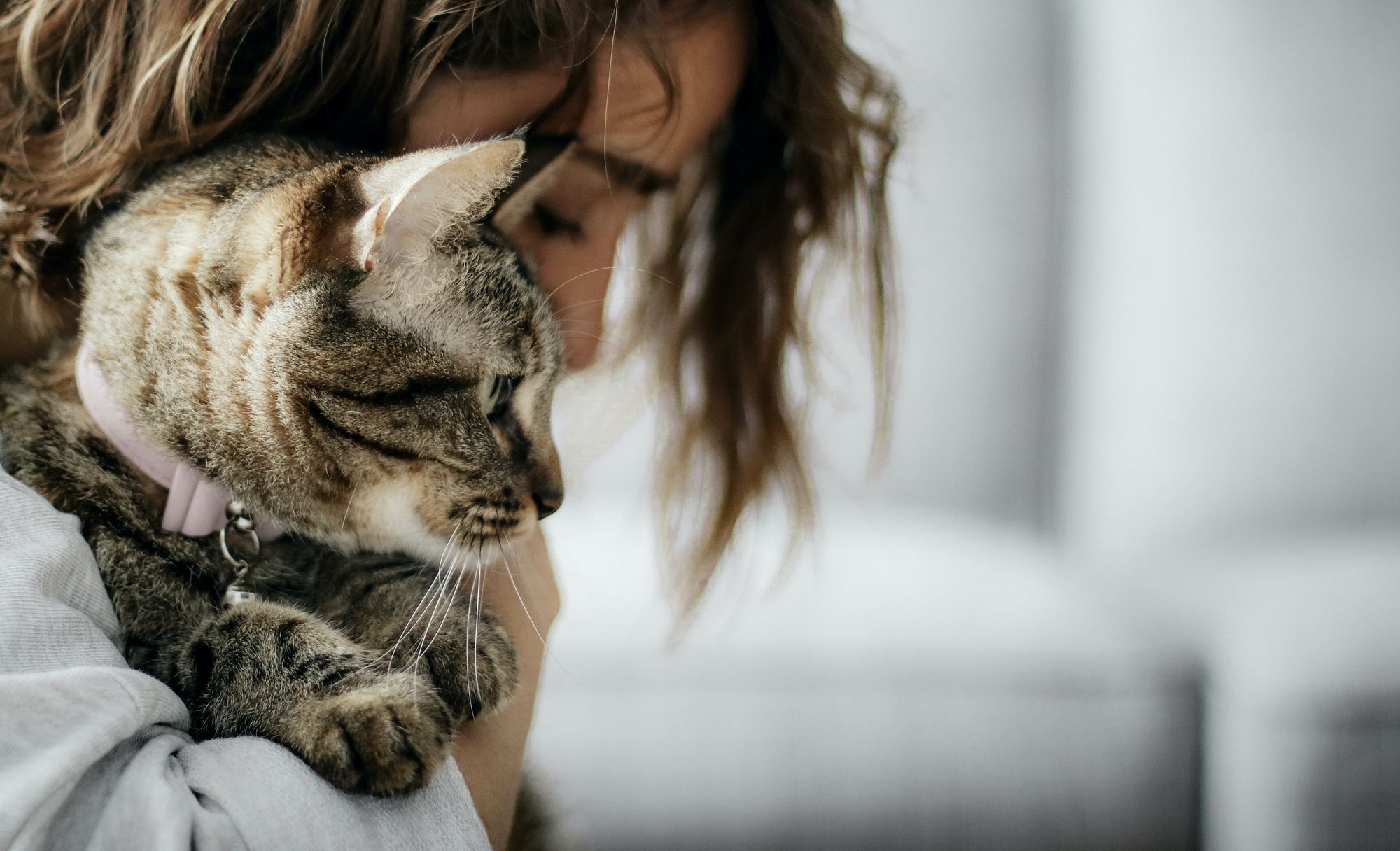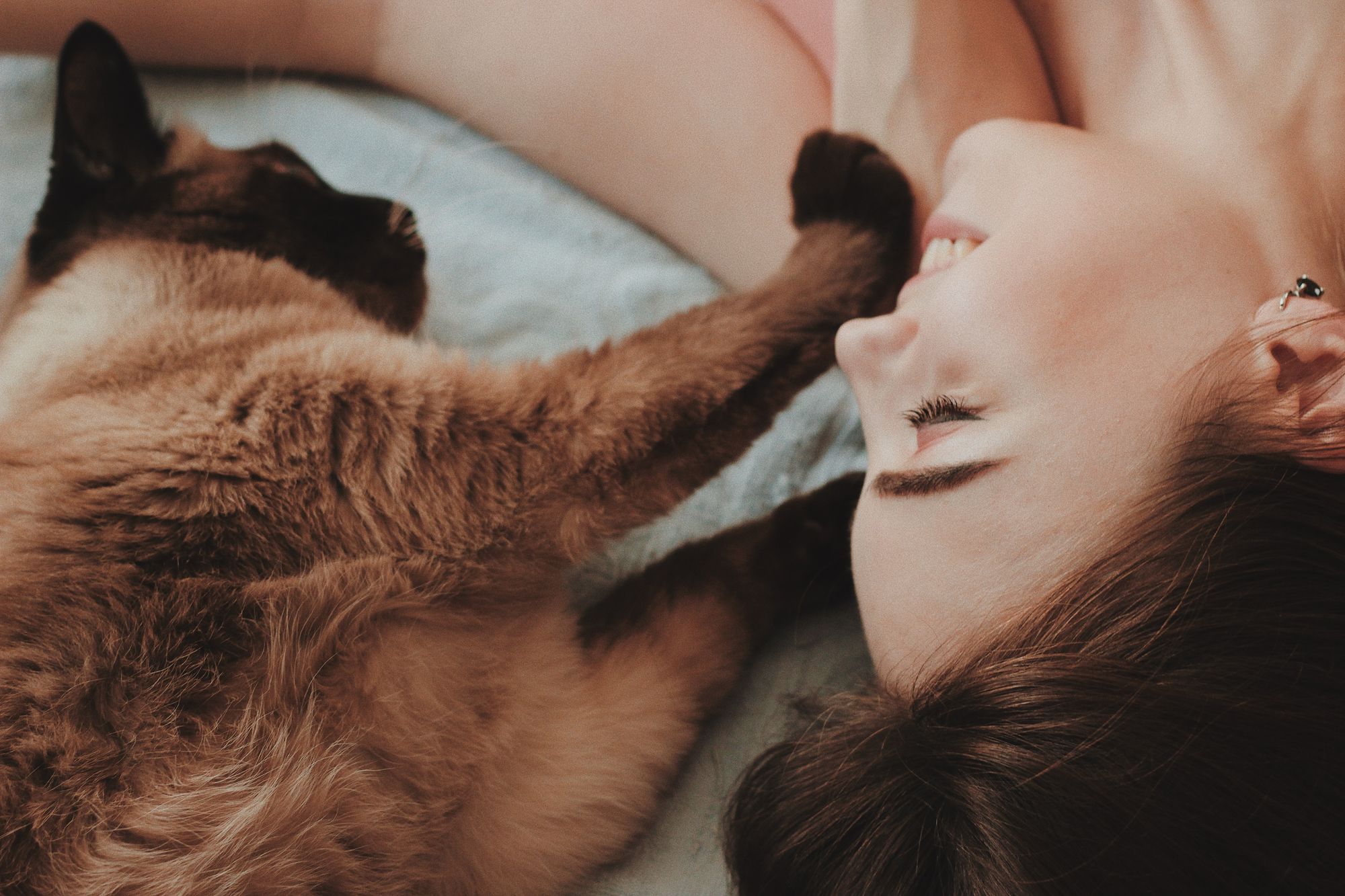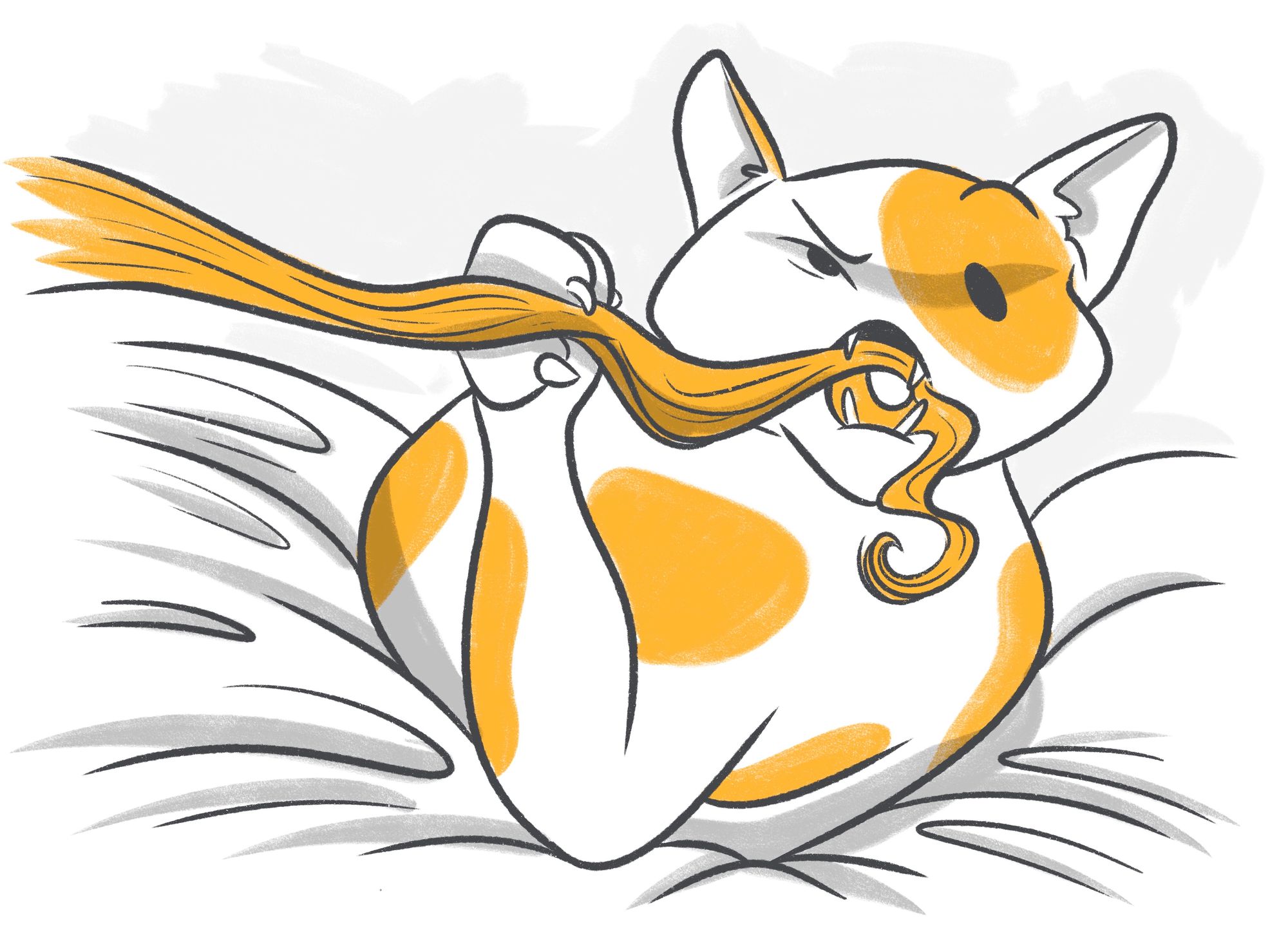With tongues that were designed with hundreds of spiky, keratin spines known as filiform papillae, cats have a knack for grooming themselves and their close kin. Yes, cats’ tongues are amazing, and they seem to have the superpower of keeping their fur free from tangles, fleas, dirt, and debris, among many other abilities.
If you’re a cat owner, you may have already felt your cat’s sandpaper kisses one way or another. And if you have experienced your cat licking your locks, you may have wondered, Why does my cat like my hair? And what if your cat not only licks but also starts eating your hair? Do they want to eat you up just like the wild things from the picture book Where the Wild Things Are when they told Max, "We’ll eat you up! We love you so!"?
Stop Googling - Ask a Real Vet
Strange cat behavior is nothing new for us cat parents, but it helps to understand why our cats do what they do. Going back, what could be the reason why cats sometimes lick and eat their humans’ hair? Read on to learn more about the phenomenon.
Content:
- Why Does Your Cat Lick or Chew Your Hair
- What Motivates Cats to Eat Hair
- Cat Attacking Your Hair
- FAQ
- Conclusion
Why Does Your Cat Lick or Chew Your Hair
Decoding cat behavior is tricky at times. However, being aware of the possible causes of their behavior may help us understand them better. For instance, if you notice your cat licking your hair, you might ask yourself, "Why does my cat lick my hair?" Below are the most common reasons why cats may lick or chew on the hair of their humans.
To express their love and affection
Cats don’t just groom anyone. Grooming for them is typically reserved for those that they have a close affinity with. In technical terms, this behavior may be referred to as allogrooming, which usually centers around grooming the head and neck area of another cat in their circle, indicating affection and bonding.
The same may hold when a cat grooms their humans. So if your cat is licking and chewing your hair, it may just mean that they see you as part of their family and are expressing their affection towards you.
This phenomenon may be explained scientifically. Each cat has their scent signature, and olfactory signals play a big role in a cat's world. While you may not realize it, your cat is marking you as part of their pack by rubbing and grooming you.
They’re seeking attention
"Why is my cat licking my hair at particular times?", you might ask. If you notice your cat licking or chewing your hair during mealtimes or at night, for instance, they might just be seeking your attention. And if they do get your attention, it’s probable for them to repeat the behavior during those particular times.
They’re playing
If you’re familiar with cat toys and accessories, you’ve probably noticed that strings, tassels, and ropes are among their common features. And if your cat loves playing with toys like these, they may look at your hair with a playful streak, especially when you have long hair that moves and sways. If this is the case, you may see them pounce, bat their paws, or chew on your hair, just as they would with cat toys.
To comfort themselves
If your cat is excessively licking and chewing your hair, the cause may be something more serious. Overgrooming in cats is oftentimes due to stress or a skin problem such as dermatitis.
Stress
Cats are sensitive beings that like predictability. If you notice your cat overgrooming (including licking and chewing) themselves, other cats, furniture, or you and/or your hair for that matter, it may be stress-induced. Think about it: Has something changed in your cat's routine recently?
If you moved into a new home, for example, and it was during this time that you noticed your cat's constant licking and chewing, it's likely due to the move. If so, it is important to help your cat transition to the new area. If possible, let them be around familiar things from the old house that they've already rubbed their scent against to help them adjust.
Meanwhile, if a new pet has arrived and you notice your cat overgrooming and licking or chewing your hair, they are probably anxious about the new pet. If so, it is best to slowly introduce your new pet instead of allowing them to be together in the same room too quickly. Keep them separate at first, then gradually let them see and interact with each other before letting them stay in the same room together.
Skin Problems
If you notice bald patches in your cat and if they are showing signs of overgrooming either themselves, other pets in the house, or you, it may be a sign of a skin problem such as dermatitis. If so, it is important to have your cat checked by their veterinarian to determine the cause and be able to address it.
To monitor your pet for any symptoms of physical, behavioral, or medical issues, a pet camera such as the Petcube Camera will come in handy. That way, you may be able to detect abnormal signs, such as cat overgrooming, early on.
What Motivates Cats to Eat Hair

If you’ve ever caught your cat eating your hair, you may be wondering, "Why does my cat eat my hair? Is it appetizing for them?"
When your cat licks or chews your hair, they may accidentally swallow a strand on occasion. However, when they repeatedly eat your hair on purpose, they may have a medical condition called pica, which is the repeated chewing and ingestion of things that don’t provide any nutritional value to the animal, such as fingernails, hair, or paper.
Among the possible causes of this condition are underlying medical issues, behavioral problems, and nutritional deficiencies. While any cat may develop pica, it seems to be more common in cat breeds such as the Siamese, Tonkinese, and Burmese, according to NCBI study.
If you see or suspect your cat is eating your hair on purpose, it is essential to schedule an appointment with your vet to determine what is causing the behavior as well as to prevent any blockage in the intestines since human hair isn’t digestible by cats.
Cat Attacking Your Hair
If your cat is attacking your hair, you might be wondering what's going on. Is your cat becoming a zombie?
Kidding aside, because cats have a natural hunting instinct, they might act out scenarios during playtime. Unfortunately, your hair (or head) may be a victim of their hunt. Oof!
While we hope that no accident happens, there's a possibility of emergencies in these cases. With this in mind, it is wise to have a trusted pet Emergency Fund to be prepared for such pet emergencies. That way, you can focus on treatment and recovery and not worry about veterinary bills.

To prevent your playful cat from attacking your hair, you can redirect their attention and provide different outlets for their energy. For example, when your cat reaches your hair and shows aggressive symptoms, grab a toy to divert their attention. Rod-like toys and those with bells, for instance, are great at getting the attention of cats.
FAQ
Why does my cat play with my hair?
One possible reason is that they are acting out their hunting instincts. It could also be because they are bored. Remember to give your cat enough attention and stimulation (both physical and mental).
If you are worried about your cat constantly playing with your hair, it's best to consult with your veterinarian or animal behaviorist to determine what is causing the behavior.
Why does my cat sniff my hair?
If your cat is sniffing your hair, it may be a sign of affection. Lick your occasional hair; it may be your cat’s way of expressing that you’re part of their tribe. On the other hand, it may also be because they like the scent of your shampoo.
Why does my cat bite my head?
If your cat bites your head, it could be because they have excess energy or they may be acting out their hunting instincts. Being bitten, especially in the head, is dangerous. Because of this, it is necessary to consult with a veterinarian and address the behavior as soon as possible.
Conclusion
There are various possible reasons why your cat licks, chews, or eats your hair. In many cases, it doesn’t pose any harm. However, if it is done repeatedly, with aggression, or comes with other symptoms, it may be a sign of a medical or behavioral issue.
Being aware of why your cat does it is essential to determine whether you need to address it. If you’re unsure, it’s best to consult with your veterinarian.
Was this article helpful?
Help us make our articles even better









